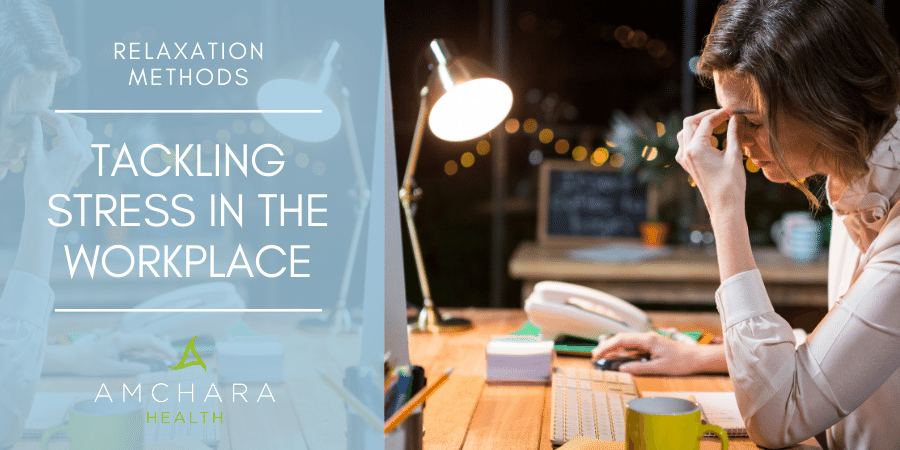Topics Covered in this article:
Stress in the workplace affects over half a million people in the UK and it is thought that 15.4 million days off work are due to stress related illnesses. Some of the most common features of workplace stress include anxiety, depression, poor immune functioning and the feeling of overwhelm.
Quitting a stressful job may not be an option but there are steps you can take to minimise or manage workplace stress.
We always take an evidence-based approach and aim to provide you with actionable knowledge and tips to help you on your journey to optimal health and in this article we take a look at the stress response, how things can build up and what you can do about it.
What is stress?
Stress can be physical or psychological – just as intense or endurance exercise puts pressure on the body, similarly your thoughts, feelings and negative emotions can also create strain and lead to the build up of stress.
The stress response has evolved as a mechanism to deal with danger. Hormones such as adrenaline and cortisol are released to prepare your body and mind to deal with a situation deemed a threat by the nervous system.
A certain degree of pressure enhances functioning of the mind and can be motivating, but when your stress response is chronically activated by many factors and unable to ‘switch off’, problems can arise.
In modern society the vast number of stressors can become overwhelming for your nervous system. Workplace stress is becoming a leading contributor to poor health and issues with mental wellbeing.
What are the major causes of workplace stress?
Each person experiences stress in an individual way – for example, for one person a tight deadline may be motivating but for someone else it may cause anxiety. In surveys, the number one workplace stress is workload – tight deadlines, too much work or increased pressure or responsibility.
Working patterns can cause stress, such as set hours – weekend work or inflexibility may particularly impact working parents. Lack of control at work, being told what to do or not being given much say in how work is carried out can feel restrictive. Inadequate finances or resources to complete work effectively can add pressure. Poor managerial support, no review or appraisal process and organisational changes at work can also take their toll. Role uncertainty and lack of security within a job can impact levels of work-related stress.
Effective interpersonal relationships at work are important for workplace wellbeing and productivity – issues with your colleagues or management can create tension.
How does workplace stress affect the body?
Regardless of whether stress hormones are released due to physical or psychological reasons, they have the same impact on the body.
The stress hormones cortisol and adrenaline exert a variety of effects upon the body including mobilising stored sugars for energy, increasing blood pressure and heart rate and redirecting blood from the skin and digestive tract to organs like the muscles and brain.
A range of signs and symptoms are associated with workplace stress. The most commonly reported issues are mental health issues like depression and anxiety (1).
Other symptoms can include:
- Irritability
- Oversensitive emotions
- Insomnia
- Fatigue
- Headaches
- Muscle tension and aches and pains
- Brain fog
- Palpitations
- Digestive disturbances like cramps, diarrhoea and constipation
- Increased PMS
- Frequent colds and infections
Tackling workplace stress
Taking several approaches and making changes one at a time may significantly help you to manage workplace stress.
1. Choose your path
Although it can feel like you have no control over certain factors, you do have the ability to choose your path when under stress. Take a moment to consider the situation you are in and take a breath.
You can choose to:
Accept – this is the way it is going to be, and you may be unable to influence some situations. Move on. Not always the easiest step to take.
React – this is often quick and driven by the unconscious mind as a defence mechanism. Reacting to a stressor in the workplace can lead to many emotions such as anger, anxiety, irritability, frustration and depression.
Respond – a more considered path. Using more rational parts of the mind and facts, a pathway to tackle the stressor can be chosen. The most appropriate positive steps can be considered and implemented. Choosing to respond, rather than react, to a stressor enables change.
2. Don’t internalise
Worrying about finances, workload or professional relationship issues can increase anxiety levels and negatively impact your mental health and sleep quality. Insomnia and poor quality sleep increase the risk of errors and accidents within the workplace and reduces productivity (2).
Find someone to discuss issues with, getting it off your chest can sometimes be the first step to recognising and accepting what’s causing problems. Plus, the person you open up to may have a different perspective and be able to offer positive advice. Try discussing issues with a manager or colleague. Friends and relatives may also be useful. If you feel that the issues run deeper, a consultation with a counsellor or life coach may be beneficial.
3. Avoid ruminating
Ruminating is the process of going over and over negative thoughts or emotions – it can lead to over thinking and obsessing over things. Ruminating adds to your stress load.
If you feel yourself going over and over a situation or thought, stop and take a breath. Take your mind away from the thought and put it aside for later. Setting aside 15 minutes or so each day for worrying or going over a thought or issue can help you to compartmentalise.
Create a healthy distraction to keep your mind busy. This can be a gentle walk in nature, an exercise session, meditation or mindfulness or a creative hobby. Keeping active can help to distract your mind from a particular issue.
Identifying one thing that you can do to overcome the focus of your rumination may also help. This gives a sense of satisfaction that you are doing something about it.
4. Choose the right foods
What you eat can have a profound impact on how your body and mind functions. Workplace stress puts demands upon the adrenal glands and opting for sweet, sugary and processed foods, such as white refined flours in bread, cakes and biscuits, creates blood sugar imbalances. After the initial blood sugar ‘high’ after eating these types of foods there is a resultant drop in blood sugar, leading to the adrenals being called in for support. Alcohol and caffeine also negatively influence blood sugar.
Choose foods that are nourishing and help to stabilise blood sugar such as protein and fibre. Including protein rich foods such as fish, chicken, eggs, beans, lentils, nuts and seeds with each meal or snack is important. Aim to eat 8-10 portions of fruit and vegetables a day, with an emphasis on vegetables.
Oats are a good source of fibre and can be a great breakfast and you can add them to smoothies. Caffeine free drinks such as rooibos and herbal tea or chicory root ‘coffee’ are useful alternatives.
5. Get quality sleep
Lack of sleep can cause daytime fatigue and a reduction in productivity and quality of work. Poor sleep can make you feel oversensitive, irritable and is linked to depression (3).
Sleep quality seems to be as important as how long you sleep. Helpful tips to enhance sleep quality include setting your natural circadian rhythm. The circadian clock is influenced by the presence of light. Ensuring you are exposed to natural daylight before noon is important, aim to take a walk, perhaps on the way to work or at a designated break time. Avoid staying indoors too long – fluorescent office lighting or other artificial light is far weaker than natural sunlight. At the other end of the spectrum, avoid light emitting devices in the evenings. Blue light from smartphones, tablets, laptops and TVs tricks the circadian clock into thinking it is daytime and less of the sleep hormone melatonin is secreted (4).
6. Relaxation methods and CBT
Regular self-care techniques are known to be supportive of stress. Relaxation therapies or activities such as massage, yoga, tai chi, breathing techniques and progressive muscle relaxation have all shown to be of benefit.
Mindfulness based stress reduction has consistently been shown to reduce stress, anxiety and rumination (5). Mindfulness at work has also been shown to reduce emotional fatigue and improve job satisfaction (6).
Cognitive behavioural therapy also shows benefits to stress and even a short CBT course may give significant improvements to rumination and symptoms like fatigue (7).
Takeaway
Stress can be inevitable and can be a major factor in both mental and physical health. Responding to workplace stressors and making positive changes can help you reduce the impact of work-related stress.
If you are struggling with work-related stress and would like to know more about how nutritional and lifestyle changes may benefit you, a consultation with an experienced Personalised Health practitioner may be helpful.
We’re dedicated to providing you with both insightful information and evidence-based content, all orientated towards the Personalised Health approach.
Did you find this article useful? We would love to know your thoughts.
Let us know your top tips to help with workplace stress.
Read this next:




